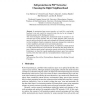Free Online Productivity Tools
i2Speak
i2Symbol
i2OCR
iTex2Img
iWeb2Print
iWeb2Shot
i2Type
iPdf2Split
iPdf2Merge
i2Bopomofo
i2Arabic
i2Style
i2Image
i2PDF
iLatex2Rtf
Sci2ools
121
click to vote
EURONGI
2006
Springer
2006
Springer
Self-protection in P2P Networks: Choosing the Right Neighbourhood
Abstract. In unstructured peer-to-peer networks, as in real life, a good neighbourhood is not only crucial for a peaceful sleep, but also for an exchange of important gossips and for finding good service. This work investigates self-protection mechanisms based on reputation in unstructured peer-to-peer networks. We use a simple approach where each peer rates the service provided by others and exchanges the collected knowledge with its direct neighbours. Based on reputation values peers manage their connections to direct neighbours and make service provisioning decisions. To quantify the impact of our proposed scheme, we implement a simple protocol in a fully unstructured peer-to-peer network. We show that free riding and the impact of malicious peers trying to poison the network with bad files is minimised. Furthermore, we show that a good neighbourhood protects peers from selecting bad files, while free riders suffer in a bad neighbourhood of malicious peers.
Computer Networks | Direct Neighbours | EURONGI 2006 | Malicious Peers | Unstructured Peer-to-peer Network |
| Added | 22 Aug 2010 |
| Updated | 22 Aug 2010 |
| Type | Conference |
| Year | 2006 |
| Where | EURONGI |
| Authors | Ivan Martinovic, Christof Leng, Frank A. Zdarsky, Andreas Mauthe, Ralf Steinmetz, Jens B. Schmitt |
Comments (0)

